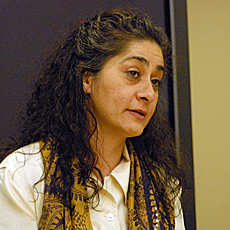
My name is Jessica Lenahan and I am a survivor of domestic violence and an advocate for battered women and children. Six years ago, I turned to the Inter-American Commission on Human Rights (IACHR), an international tribunal responsible for promoting and protecting human rights throughout the Americas, because the justice system in the United States had abandoned me. Today, IACHR issued a landmark decision in my case that found that the United States violated my human rights and those of my three children, Rebecca, Katheryn, and Leslie.
In 1999, my estranged husband, Simon Gonzales, kidnapped Rebecca, Katheryn, and Leslie in violation of a domestic violence restraining order I had obtained against him. I repeatedly contacted and pled with the Castle Rock Police in Colorado for assistance, but they refused to act. Instead, over a 10-hour period, the police responded to a fire-lane violation, looked for a lost dog and took a two-hour dinner break. Late that night, Simon arrived at the police station and opened fire. He was killed and the bodies of my three girls were found in the back of his truck. No investigation ever took place to determine the cause, time and place of my children's death.
I sued the town of Castle Rock for failing to enforce the restraining order I held against my husband. My case went all the way to the Supreme Court, but they ruled that the enforcement of a restraining order wasn't mandatory under Colorado law.
I felt utterly abandoned, but I wasn't done fighting. Instead I turned to IACHR.
In a decision released today, the commission found that the U.S. is failing in its legal obligation to protect women and children from domestic violence, and makes clear that the U.S. government has a duty to protect domestic violence victims by taking steps to ensure their safety, including the enforcement of restraining orders. It also requires that the U.S. examine how it fails domestic violence victims and ensure that victims of domestic violence receive adequate protection from their abusers.
But this decision isn't just about me.
In the United States, an estimated 1.3 million women are victims of physical assault by an intimate partner each year, and every day more than three women are killed by their intimate partners. These statistics reveal that domestic violence amounts to nothing less than an epidemic and the failure of police to enforce the law directly contributes to this epidemic. A 911 call to the police must mean something and the police can't ignore multiple emergency calls throughout the course of the night as they did in my case.
I did everything I was supposed to do on that fateful night to protect and save my daughters. I even would have tried to rescue them myself had I known the police would do nothing to find them or to enforce my restraining order. We respect our laws because we believe they embody our government's commitment to protecting our lives and the lives of our children. Unfortunately, I had to lose everything to realize that we are often not guaranteed basic protections from our government unless we demand them.
The IACHR decision can stimulate necessary changes in U.S. law and policy, if the U.S. government takes IACHR's assessment of law enforcement's failings seriously and implements its recommendations.
I hope my case will serve as an important precedent that other women can rely on when they find themselves in a similar situation where the police refuse to enforce a restraining order. I urge you to rely on it to speak out on the issue of domestic violence and to make sure that our government hears you.
You can learn more about the IACHR report, as well as my case and the process that led to my petition to the IACHR, here, here and here.
Learn more about violence against women: Sign up for breaking news alerts, follow us on Twitter, and like us on Facebook.


